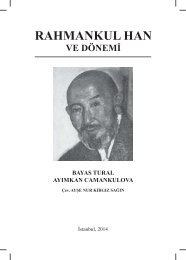THE SOVIET HISTORIOGRAPHY AND THE QUESTION OF KAZAKHSTAN’S HISTORY
SOVYET-TARIH-YAZICILIGI-ENG
SOVYET-TARIH-YAZICILIGI-ENG
You also want an ePaper? Increase the reach of your titles
YUMPU automatically turns print PDFs into web optimized ePapers that Google loves.
<strong>THE</strong> <strong>QUESTION</strong> <strong>OF</strong> <strong>KAZAKHSTAN’S</strong> <strong>HISTORY</strong> 109<br />
IMPORTANT ISSUES <strong>OF</strong> KAZAKHSTAN <strong>HISTORY</strong><br />
IN <strong>THE</strong> WORKS <strong>OF</strong> E. BEKMAKHANOV<br />
Asst. Prof. Dr. Gülnar KARA *<br />
Introduction<br />
The dissolution of Soviet Union in 1991 has created different perspectives<br />
about the history of Turkish communities that lived in this<br />
geography. The studies and research made during the Soviet period,<br />
with its ideological pressure, started to be questioned and the white<br />
pages of the history started to be opened one by one. The independence<br />
of Kazakhstan created the opportunity for historians to look<br />
at the political, socio-economic and legal dimensions of Kazakh state<br />
structure from a different perspective. We can say that especially the<br />
colonization of Kazakhstan by Russia and research about the national<br />
liberation struggle of the Kazakhs were forced to be told in different<br />
ways. The period when Czarist Russia colonized Kazakhstan is the<br />
time when the Kazakh community was in contradiction and also the<br />
time when the Kazakh plains turned into one of the regional states of<br />
neighboring countries. The liberation struggle of the community who<br />
reacted to this is another dimension of this topic. During the early<br />
Soviet era, the attitude and policy of Czarist Russia towards other<br />
non-Russian communities were criticized greatly. All the resistant movements<br />
against Czarist governance were seen as national struggles. In<br />
the first half of 20 th century, the “trade capitalism” concept of M. N.<br />
Pokrovskiy 168 was dominant in evaluating the foreign policy of Czarist<br />
*<br />
Bitlis Eren University<br />
168 Mihail Nikolayevic Pokrovskiy, historian and politician from USSR. He was born as the<br />
son of a customs official in 1868 and after graduating successfully from high school, he went<br />
to Moscow University. In 1905 he became member of Russian Social-Democrat Labor Party.<br />
He was arrested for participating in December Rebellion and in 1906 he took refuge in<br />
France. During his asylum period he wrote his important works “Russian History from Ancient<br />
Times to Recent Times”, 5 volumes, (Russkaya İstororiya s Drevneyşih Vremen) and “Main<br />
Lines of Russian Cultural History (Oçerk İstorii Russkoy Kultury). After the Bolshevists took<br />
over the government from Czarist governance in 1917, he went back to his home country and<br />
worked in different academic institutionp. Interpreting Russian History from a perspective<br />
tightly bound to Marxist-Leninist principles, M. N. Pokrovskiy underlined in his studies that<br />
socialist revolution and proletarian dictatorship were the inevitable political results of Marxism<br />
and that dialectical method was important. One of the most fundamental principles of<br />
Pokrovskiy’s opinions was “commercial capital”, and he thought that the driving force behind<br />
Russia’s colonizing policy was this; he also put forward the concept of “absolute evil”. After<br />
Stalin took over the government his opinions were criticized as anti-Marxist and unscientific.<br />
Following his death his books were collected from libraries and the representatives of



